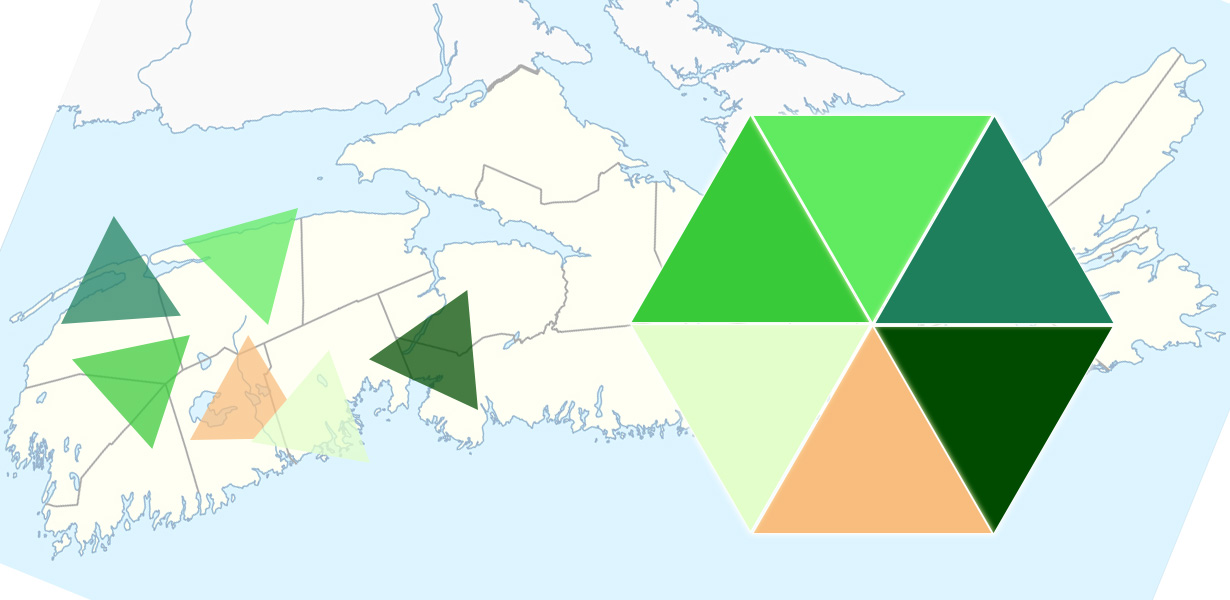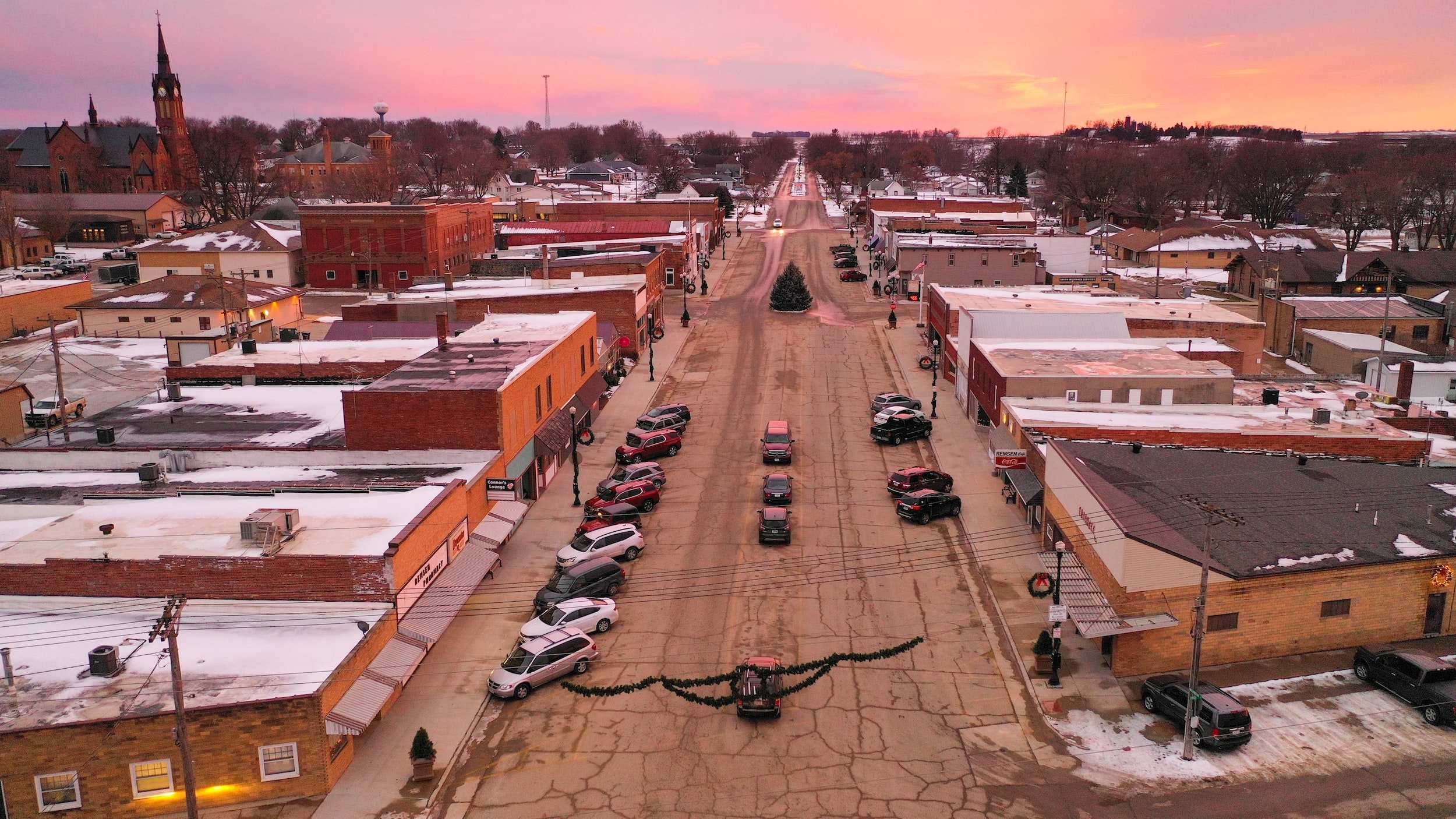Phase Zero: Testing Community-Based Strategizing

By: Kjeld Mizpah (KJ) Conyers-Steede
Fellow, Inspiring Communities
My ah-ha Moment
When I started this journey, I wanted to understand the impact of economic policy in a post-pandemic world, specifically on rural communities. As someone who worked closely with the economic development community during the pandemic, I saw firsthand how a top-down approach to innovative practices develops a sense of mistrust in the policy development ecosystem. However, one pandemic decision that proved to be successful was adopting a regional lens. This fostered a sense of economic and social cohesion that created a unique economic development strategy: to encourage a sense of a regional circular economy.
When I engage with different community champions, they discuss a desire to embrace a regional approach to development. I realize our current policy structures hinder regional development when I hear this. As I have stated, our governance structures must improve their ability to collaborate on collective economic prosperity. We must be equipped to embrace this mindset. We need to unrealize and combat this damaging and outdated ideology – a normalized governance culture that values individualism instead of cohesion stems from the first settlement of Port Royal.
We have emphasized economic output for centuries without considering the unique opportunities to develop our economy based on specialized nodes, providing specialization and economic cohesion throughout the region. Encouraging a sense of interdependence provides an opportunity to work cooperatively to solve complex challenges because each node is important for developing a collective economic output. Throughout this fellowship, I have often wondered if our policy development were to view opportunities and challenges through a regional lens, how might the economic and social future of Atlantic Canada grow?
Our desire to standardize policy development based on the needs of election cycles has created divisions and mistrust throughout the policy ecosystem. Communities and their champions feel disconnected from power, causing a race to control our development mechanisms. This quest has caused Atlantic Canada to elect and dethrone their governments almost every election cycle, throwing out policy strides and encouraging deeper mistrust with our systems.
This colonial bug that holds the region hostage hinders an opportunity for a collective governance culture that embraces systems thinking approaches to shift the region’s governance culture. When I started this research, I assumed that the barriers to seeking understanding were connected to political and financial will. But my assumptions have been proven wrong; I now believe a barrier is the region’s risk-averse nature to innovation. A trait that I believe most North American British-Empire nations have is “Never complain – Never explain” – a stiff-upper-lip mindset that flags a Commonwealth nation as reliably as a Union Jack above the parliament building.

I touch on this in my second update; as I was touring Prince Edward Island during the 2023 Canada Games, the investment to host the Games could be seen throughout the Island. This stemmed from policymakers embracing the notion of truly investing in growth. There needs to be a collective mindset to develop the island with community-based assets that will have a lasting impact. The doubt developed over three months between the Games and sustaining their legacy shows the cracks within our economic foundation and, with it, an opportunity for economic cohesion.
As Commonwealth jurisdictions, we have evolved to embrace economic and social innovations. Still, we need help to develop a governance culture that embraces the fact that we are a collection of communities because if we do, our strategy approach will shift away from a winner-take-all approach.
Empower the Community
Resolving this defect takes two phases. First, we must understand that by deciding to live within the region, we must embrace our communities’ strengths, assets, and, most importantly, historical differences that could hinder collaboration. The second phase is building the capacity to empower communities and their champions. When unlearning our design practice, we must understand that transformational change within systems starts with empowerment. We have failed to realize the generational trauma of economic colonization that Commonwealth countries have faced since the age of discovery. Since the Second World War, most Commonwealth realms have transitioned into independent states with the same mindset used to colonize them. This can be seen through how governments approach economic development.

When I look at the different communities I have lived in, they all experienced some form of difficulty in their economic direction, which hindered community buy-in. When I lived in Saint John, New Brunswick, the municipality struggled to understand generational poverty and the navigation of regional economic development. When I lived in Fredericton, it was talent retention, as Fredericton’s cyber security industry was emerging. When I lived in Halifax, the region dealt with an affordability crisis driven by expanded responsibilities and limited support. For the last nine years, I have seen how the difficulty of implementing transformational change was hindered because of the lack of collective community strategizing and limited strategic foresight to building a culture of meaningful collaboration.
I have started to reflect on these situations and wondered, at the local level, what would have happened if these communities had a strategy connected to the upstream policy development process. And more importantly, whose responsibility would it be to test ways to break the siloed approaches to community and economic development? As I reach my midway point throughout this experience, I crave to understand the process of developing this culture.
The Idea: Connecting a Collection of Communities
As I venture into the next phase of this research project, I am living in a perfect place to explore and test ways to approach sustainable economic development that embraces social and environmental needs. I am seeking ways to explore approaches to develop economic growth that can advance communities by connecting the upstream and downstream implementation of policy development and innovating the approach to the discovery phase of policy development. This has a unique opportunity to be tested as Nova Scotia dreams big by creating the Joint Regional Transportation Agency. At first glance, this agency’s mandate is to develop a network of transportation assets that connects the province’s economic hub with the surrounding communities. As a political ecosystem is pressured to develop affordable solutions to Nova Scotia’s unaffordability crisis, I wonder how communities plan to embrace this project through a collection of communities lens.
As I engage with different community champions throughout the region, shifting the conversation of economic development into normalizing the importance of community strategizing is critical in transitioning our systems. Looking at Atlantic Canada, our economic future is in a state of transition, and to ensure we don’t create deeper divisions, we must start within the economic development process. There is a potential to develop a network of community champions that informally build and understand the importance of embracing innovative practices when exploring economic growth. When looking at Nova Scotia, especially in rural Nova Scotia, we can develop an informal social innovation space that shifts policy development into communities and out of government buildings. To test this theory, I want to explore an idea I am creating called the Town Project.

The Town Project: Phase Zero
Encouraging a sense of co-creation through capacity building has become my takeaway throughout this project. As the region develops, we must strategize as a collective and encourage the exploration of a governance culture that can thrive in a transformational change environment. Through capacity building, strategic policy creation, and meaningful financing, we as a region could be the catalyst to impact the governance culture. One benefit of being one of “the last” regions to develop within Canada is we can learn from the good, bad, and the ugly and, through our national soft power, have an opportunity to test an idea that can shift economic development throughout the Commonwealth.
As someone who lives between design and systems thinking, I am building the case to test the idea of embracing community design to enhance development strategy within siloed communities. When looking at the private sector, it is proven that if businesses embrace human-centred design throughout their business model, they can navigate shifting landscapes to improve their performance. If you view this through a community/economic development lens, we could explore designing a future that encourages community cohesion.
The mistrust toward policy creation and economic amalgamation presents a wicked problem for local communities. My experience in four municipalities within Atlantic Canada has guided me to the Town Project or Case study zero. I want to merge the idea of strategizing as a collection of communities resulting in a conversation around social and economic design. As we grow as a region, the growth of our communities will have ripple effects.
To date, I have sat at kitchen tables, walked through farms, and sat at wineries. Although individuals state they are from community X, the collective concerns are similar, which showcases the need for a project that explores developing a network of champions. Through the Town Project, I will be testing the idea of creating a rural network of community champions to explore what is needed to build capacity surrounding community and economic development, both between and among communities. As Atlantic Canada explores solutions to its affordability crisis, rural communities have an opportunity to collaborate on its future.
As this fellowship ends, I encourage you to follow the journey through Catalyst Conversations Strategies exploration of Phase Zero; watch for more content in the fall.
Kjeld Mizpah (KJ) Conyers-Steede
Principal Consultant of Catalyst Conversation Strategies
(T): @catalystconvo
Join the mailing list, by visiting Catalyst Conversation Strategies
Read more of KJ’s blog posts:
- Who has power? Who exercises control? Who needs to build trust?
- The Colonial Place
- Strategizing as a Collection of Communities: Inclusive Policy Development that Embraces the Diasporic Journey
If this series interests you, be sure to mark the date for the Art of City Building, September 18. Weigh into how policy, placemaking and citizen action can come together to build equitable, thriving communities.
Share this:
Comments are closed